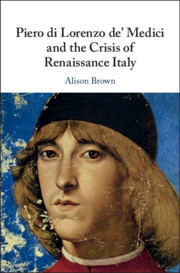Book contents
- Piero di Lorenzo de’ Medici and the Crisis of Renaissance Italy
- Piero di Lorenzo de’ Medici and the Crisis of Renaissance Italy
- Copyright page
- Dedication
- Contents
- Acknowledgements
- List of Abbreviations
- Introduction
- Part I The Early Years
- Part II Between Republicanism and Princely Rule
- Part III Piero in Power
- Part IV Piero in Exile
- Conclusion
- 20 Power and Legitimacy in Renaissance Italy
- Bibliography
- Index
20 - Power and Legitimacy in Renaissance Italy
from Conclusion
Published online by Cambridge University Press: 20 December 2019
- Piero di Lorenzo de’ Medici and the Crisis of Renaissance Italy
- Piero di Lorenzo de’ Medici and the Crisis of Renaissance Italy
- Copyright page
- Dedication
- Contents
- Acknowledgements
- List of Abbreviations
- Introduction
- Part I The Early Years
- Part II Between Republicanism and Princely Rule
- Part III Piero in Power
- Part IV Piero in Exile
- Conclusion
- 20 Power and Legitimacy in Renaissance Italy
- Bibliography
- Index
Summary
Piero’s life has been a missing chapter in the history of Florence during its transition from republic to principate, considered irrelevant, except by its failings, to the crisis of Italian states at this time. As with any biography, the importance of his life lies in providing a witness to events as they happened – in his case the threat to Italy’s, and especially Florence’s, stability in the face of foreign invasions. Piero was very articulate in expressing himself and the pressure he suffered in his unofficial role as Florence’s capo, neither powerful enough to rule nor free enough to indulge his talents and pleasures as a prince. He enables us to appreciate the situation faced by republics like Florence that had become territorial states without the military power or the permanent leadership to withstand foreign armies – except at risk of being accused of tyranny. This, of course, was Piero’s fate, and it again raises the question of whether he was the ambitious tyrant that his reputation suggests or whether, instead, his temperament and experience would have qualified him to be the new type of civilian ruler that political realists like Machiavelli, Francesco Vettori and Guicciardini were proposing for Florence after the unexpected death of Piero’s son in 1519.
Keywords
- Type
- Chapter
- Information
- Piero di Lorenzo de' Medici and the Crisis of Renaissance Italy , pp. 301 - 307Publisher: Cambridge University PressPrint publication year: 2020



